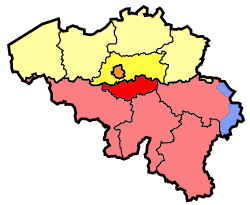Language problems
The tensions between the communities of Belgium arose around a struggle between the country's two main language communities Dutch and French. That resulted in extensive language legislation but did not solve the conflicts between Flanders and Wallonia, the two main regions of the country. Widespread discrimination against Flemings, symbolized by the bad treatment of Flemish soldiers during World War I, made the Flemish organise against the mostly French-speaking government. After World War II, the differences between Dutch-speaking Belgians and French-speaking Belgians became clear in a number of conflicts.
In 1950, a referendum on the position of King Leopold III was held. The Royal Question was whether he should be allowed to return to the throne, in view of his position during World War II. Nationally, 58% of voters supported the restoration of Leopold III. However, there were strong regional differences. Of those who voted, 72% percent of the people in Flanders were in favor of his return, but 56% in Wallonia and 52% Brussels opposed his return. With the support of more than half of Belgians, Leopold III returned to the throne. Following his restoration, anger among Leopold's opponents in Wallonia and Brussels grew into rioting that the government had struggled to contain. Pressure from the government forced Leopold III to abdicate.
In 1960, the Catholic–Liberal government of Prime Minister Gaston Eyskens introduced a number of budget cuts. French-language trade unions went on strike against the cuts and against the government. They felt that a more regionalized system was needed to take the measures that Wallonia needed and that the Walloon interests were hurt by a Flemish majority in Belgium. They spoke of un état belgo-flamand, a Belgian-Flemish state. In response to the strikes, the government announced a regionalization of socio-economic policies.
Another tension between the language communities involved the Catholic University of Leuven. The university had for long been French-speaking, but Dutch played an increasingly important role in the 20th century. The tensions caused by the continued presence of a French-speaking section of the university grew through the 1960s and led to Flemish students rioting, supported by the population of the Flemish city of Leuven. A comment by a French-speaking social geographer of the university, who suggested that Leuven be included in the officially bilingual Brussels area, caused demonstrations from Flemish citizens and politicians; their main slogan was "Leuven Vlaams – Walen Buiten!" (Leuven Flemish, Walloons Out!) The tensions caused the collapse of the government of Prime Minister Paul Vanden Boeynants; the university was split into the Dutch-speaking Katholieke Universiteit Leuven and the French-speaking Université catholique de Louvain, united within a common governing body.

